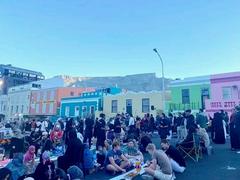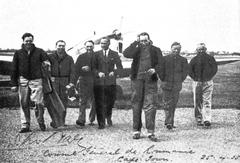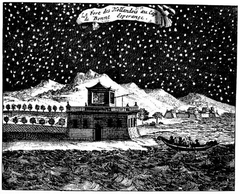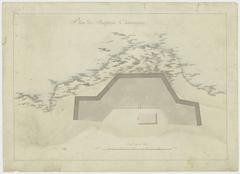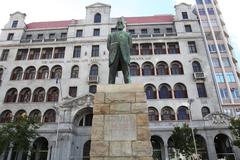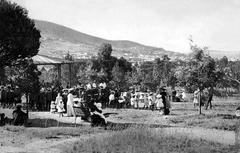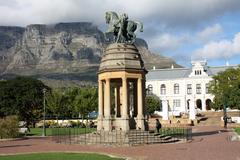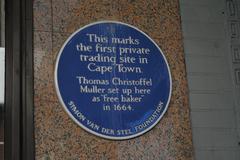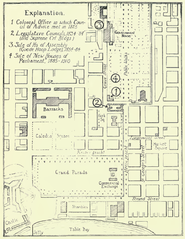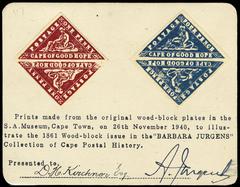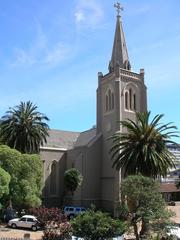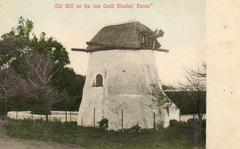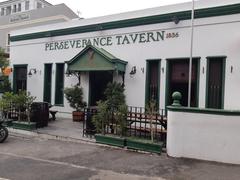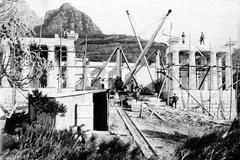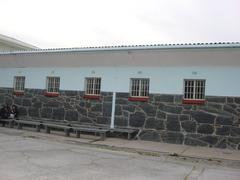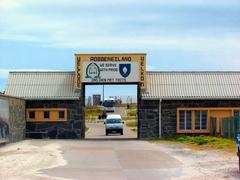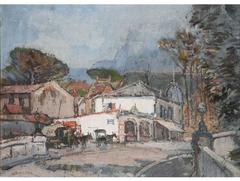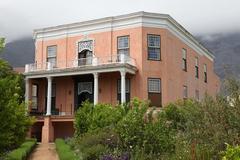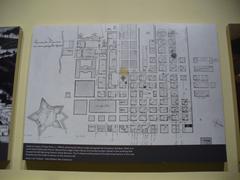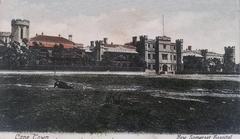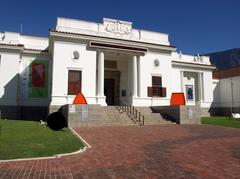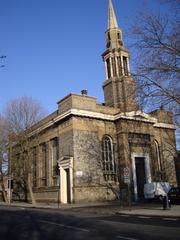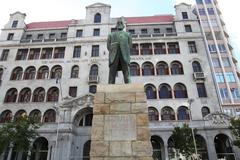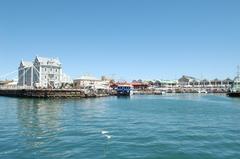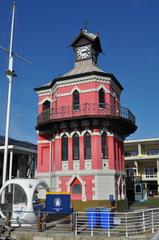
Comprehensive Guide to Visiting Cape Town, City of Cape Town, South Africa
Date: 13/08/2024
Captivating Introduction
Imagine a city where mountains rise like ancient sentinels from the sea, where every street corner whispers tales from centuries past, and where vibrant cultures meld to create an ever-evolving tapestry of life. Welcome to Cape Town—South Africa’s Mother City. Whether you’re drawn by the allure of its storied history, its breathtaking landscapes, or the promise of adventure, Cape Town has something to captivate every traveler.
Cape Town, nestled at the southwestern tip of Africa, first caught the eye of Portuguese explorer Bartholomeu Dias in 1488. This was just the beginning of its long and fascinating history, which saw the Dutch East India Company establishing a refreshment station here in 1652 (Wikipedia). Over the centuries, Cape Town evolved from a modest settlement into a bustling metropolis, marked by colonial struggles, vibrant cultural influences, and the indelible scars of apartheid (Britannica).
Picture this: you’re standing atop Table Mountain, one of the New 7 Wonders of Nature, with the city sprawled below and two oceans shimmering on the horizon. Or perhaps you’re wandering through the colorful streets of Bo-Kaap, where every house is a splash of rainbow hues, reflecting the rich Malay heritage of the area. Each experience in Cape Town is a sensory feast, from the tantalizing aroma of Cape Malay curry to the rhythmic beats of local music echoing through the streets (South Africa Travel Blog).
Ready to dive into the adventure? Whether you’re a history buff, a nature lover, or a thrill-seeker, Cape Town promises a journey that will fill your heart with unforgettable memories and your soul with stories worth sharing.
Table of Contents
- ## Historical Overview
- ## Significance of Cape Town
- ## Visitor Tips for Cape Town, City of Cape Town, South Africa
- ### Best Time to Visit
- ### Safety Tips
- ### Getting Around
- ### Weather and Packing
- ### Currency and Tipping
- ### Accommodation
- ### Top Attractions
- ### Outdoor Adventures
- ### Cultural Experiences
- ### Dining and Nightlife
- ### Shopping
- ### Health and Safety
- ### Local Etiquette
- ### Hidden Gems and Local Secrets
- ### Myth Busting and Surprises
- ### Interactive Elements
- ### Time-Based Itineraries
- ### Call to Action
Historical Overview
Early European Exploration and Settlement
Did you know that Cape Town’s allure was first discovered by Portuguese explorer Bartholomeu Dias in 1488? Imagine the awe of sighting the majestic Cape of Good Hope for the first time! The local Khoi people called this area ‘||Hui !Gais,’ meaning ‘where clouds gather,’ a poetic nod to Cape Town’s often misty peaks. Vasco da Gama, another famed explorer, followed suit in 1497, further stoking European interest in this enchanting locale (Wikipedia).
Fast forward to 1652, when Jan van Riebeeck, under the banner of the Dutch East India Company (VOC), set up a refreshment station at Table Bay. This wasn’t just any stopover; it became the first permanent European settlement in South Africa. Nestled between the dramatic Table Mountain and the expansive Table Bay, this site was a strategic gem, flanked by Lion’s Head, Signal Hill, Devil’s Peak, and the Cape Flats (Britannica).
Development and Expansion
Cape Town didn’t just grow; it blossomed! The Castle of Good Hope, built between 1666 and 1679, became the fortress and administrative heart of the settlement. Picture narrow streets running parallel to the glistening shore, with the main road, Heerengracht (now Adderley Street), leading to the lush Dutch East India Company’s garden, a veritable Eden in the making (Britannica).
The fertile slopes of Devil’s Peak and Table Mountain, alongside areas like Rondebosch, Newlands, and Wynberg, soon turned into green havens, supporting the burgeoning settlement. A well-trodden track from the fortress to False Bay opened new routes for trade and transport (Britannica).
Colonial Struggles and Influence
Cape Town’s prime location made it a hotbed for colonial conflicts. In 1781, a French garrison joined forces with the Dutch to fend off British attacks, leaving an indelible mark on the city’s architecture and culture (Britannica).
The British, not ones to give up easily, first occupied Cape Town in 1795, lost it to the Dutch in 1803, and reclaimed it in 1806. British rule ushered in parliamentary and judicial systems and saw the abolition of slavery in 1834. Cape Town became the gateway to South Africa’s interior, maintaining a strong connection with Europe (SA History).
Apartheid Era
The apartheid era cast a long shadow over Cape Town, designating it a place of both oppression and resistance. The city’s layout and architecture bear the scars of this era, seen in the forced removals and segregated neighborhoods. Robben Island, where Nelson Mandela was imprisoned, remains a poignant symbol of the fight for freedom (South Africa Travel Blog).
Significance of Cape Town
Historical Significance
Imagine stepping into a time machine and landing in the 1600s. That’s what it feels like when you visit the Castle of Good Hope, a star fort that has stood the test of time since the Dutch East India Company set up a supply station here in 1652. And let’s not forget Robben Island, the Alcatraz of South Africa, where Nelson Mandela spent 18 of his 27 years in prison. Today, it’s a UNESCO World Heritage Site that stands as a powerful reminder of the struggle for freedom (South Africa Travel Blog).
Cultural Significance
Cape Town is like a potjiekos, a traditional South African stew, with ingredients from all over the world blending to create something uniquely delicious. Take a stroll through the Bo-Kaap area, where the colorful houses are as vibrant as the Malay heritage they represent. Or visit the Slave Lodge, now a museum, to delve into the lives of those who were brought to the Cape from Africa and Asia. And don’t miss the townships like Langa, where resilience and creativity turn every street into a gallery of life (South Africa Travel Blog).
Economic Significance
Tourism is the lifeblood of Cape Town’s economy. With over 300,000 jobs supported by the tourism sector, it’s easy to see why this city is a magnet for travelers. The Victoria & Alfred Waterfront is a bustling hub where you can shop till you drop or dine on cuisine that will make your taste buds dance (Expat Cape Town).
Environmental Significance
Imagine hiking up Table Mountain, one of the New 7 Wonders of Nature, and being rewarded with a view that takes your breath away. Or wandering through the Kirstenbosch National Botanical Garden, where every plant tells a story of South Africa’s rich botanical heritage. And don’t miss Cape Point, where the Atlantic and Indian Oceans meet in a dramatic dance of waves (Wander Smartly).
Social Significance
Cape Town’s social fabric is a vibrant tapestry of diverse communities. Visit the District Six Museum for a poignant look at the forced removals during apartheid. The museum is a powerful reminder of the resilience of displaced communities and a call to ensure such injustices are never repeated. Community-driven initiatives in the townships aim to improve living conditions and create economic opportunities, often showcased during immersive township tours (South Africa Travel Blog).
Insider Tips and Hidden Gems
- Best Time to Visit: The summer months (November to March) are perfect for beach lovers, but if you prefer a quieter vibe, visit in the winter (June to August) for cozy indoor activities and fewer tourists (This is Cape Town).
- Getting Around: The MyCiTi bus service is your best friend for getting around the city affordably and conveniently. Want to explore the surroundings? Car hire is a great option (This is Cape Town).
- Safety: Stick to well-lit and populated areas, especially at night. Use reputable transport services and always be mindful of your belongings (Expat Cape Town).
- Local Cuisine: Indulge in bobotie, a mouth-watering spiced minced meat dish, and biltong, South Africa’s answer to beef jerky. And of course, seafood lovers will find their paradise here (Expat Cape Town).
- Cultural Etiquette: When visiting religious sites, such as the mosques in Bo-Kaap, dress modestly and remove your shoes before entering.
Visitor Tips for Cape Town, City of Cape Town, South Africa
Best Time to Visit
Cape Town is a year-round delight, but the shoulder seasons of March to May and September to November are when the city truly sparkles. Imagine strolling through quieter streets with temperatures perfect for outdoor fun, and scoring great deals on accommodations (Travellers Worldwide). For the ultimate budget experience with a cozy twist, consider visiting in winter (June to August) (Travellers Worldwide).
Safety Tips
Cape Town says ‘welcome,’ but always keep your wits about you. Stick to well-lit, bustling areas and avoid solo nighttime jaunts in secluded spots. Use trusted transport like Uber or registered taxis (Lonely Planet). Chatting with locals or your accommodation host can provide golden nuggets of advice on places to avoid.
Getting Around
Uber is your reliable chariot for navigating Cape Town, especially for airport transfers as buses are no longer an option (Lonely Planet). Renting a car? Major rental companies at the airport are ready to kickstart your adventure. Public transport exists, but for safety and convenience, private options are your best bet.
Weather and Packing
Cape Town’s weather can be a bit of a drama queen—four seasons in one day! Pack layers, a light jacket, sunscreen, sunglasses, and a hat. Remember, even on sunny days, Table Mountain can surprise you with a brisk breeze (Lonely Planet).
Currency and Tipping
The South African Rand (ZAR) is your currency in Cape Town. ATMs are abundant, and credit cards are widely accepted. Tipping is standard, with 10-15% being the norm in restaurants. Don’t forget a tip for valets, drivers, and guides (Travellers Worldwide).
Accommodation
From opulent hotels at the Victoria & Alfred Waterfront to beachside retreats in Camps Bay, Cape Town has it all (PlanetWare). For a more local feel, consider a guesthouse or homestay in the Cape Flats, but always explore these areas with a local guide (Lonely Planet).
Top Attractions
- Table Mountain: Hike or take a cable car for panoramic views (PlanetWare).
- Robben Island: Visit the historic prison where Nelson Mandela was held (PlanetWare).
- Boulders Beach: Get up close with the adorable African penguins (The Cape Town Blog).
- Bo Kaap: Wander through the vibrant, colorful houses of the Cape Malay community (The Cape Town Blog).
- Victoria & Alfred Waterfront: A hub for shopping, dining, and museums (PlanetWare).
Outdoor Adventures
Cape Town is an outdoor enthusiast’s dream. Dive into activities like:
- Hiking: Conquer trails on Table Mountain and Lion’s Head (Inside Guide).
- Surfing: Ride the waves on Cape Town’s stunning beaches.
- Paragliding: Soar above the city from Lion’s Head (Inside Guide).
- Whale Watching: Join a tour to see majestic whales (PlanetWare).
Cultural Experiences
Immerse yourself in Cape Town’s rich history and culture:
- District Six Museum: Understand the devastating impact of apartheid.
- Castle of Good Hope: Explore South Africa’s oldest colonial building (PlanetWare).
- Slave Lodge Museum: Learn about the history of the slave trade (South Africa.net).
- Cape Town Diamond Museum: Discover the sparkling history of diamonds in South Africa (South Africa.net).
Dining and Nightlife
Cape Town’s culinary scene is a delight. Savor local dishes like Cape Malay curry and bobotie, and dive into the vibrant nightlife. Don’t miss the Springbok Experience Rugby Museum at the Victoria & Alfred Waterfront for a unique twist (PlanetWare).
Shopping
For unique souvenirs, head to Green Market Square. From wooden giraffes to colorful batiks, there’s something for everyone (PlanetWare).
Health and Safety
Travel insurance is essential! Cape Town’s tap water is safe to drink, but bottled water is also available. Stay vigilant for pickpockets in crowded areas and keep your belongings secure.
Local Etiquette
While English is widely spoken, a friendly “Howzit?” (How are you?) can go a long way in making connections. Embrace the local lingo and don’t hesitate to greet with a smile.
Hidden Gems and Local Secrets
- Kirstenbosch National Botanical Garden: A lesser-known gem for picnicking and enjoying concerts.
- Old Biscuit Mill: Dive into local crafts, food, and culture in Woodstock.
- Muizenberg Beach: Not just for surfing, but also for the colorful beach huts and vibrant atmosphere.
Myth Busting and Surprises
- Cape Town is Always Sunny: Not true! Pack for all weathers.
- Dangerous Wildlife Everywhere: Cape Town is a city with urban wildlife, but it’s not the wild jungle some imagine.
Interactive Elements
- Photo Challenge: Snap a pic with the penguins at Boulders Beach.
- Scavenger Hunt: Find the best view of Table Mountain from the city.
Time-Based Itineraries
- 24-Hour Adventure: Breakfast at the V&A Waterfront, hike up Lion’s Head, lunch in Bo Kaap, sunset at Camps Bay.
- Weekend Getaway: Day 1: Explore Table Mountain and the Waterfront. Day 2: Robben Island and a beach day at Boulders Beach.
Call to Action
As your Cape Town journey draws to a close, it’s clear that this city is more than just a destination—it’s an experience that lingers long after you’ve left its shores. From the historical depths of the Castle of Good Hope to the poignant lessons of Robben Island, Cape Town offers a rich tapestry of stories and experiences that captivate the mind and soul (South Africa Travel Blog).
But Cape Town isn’t just about looking back; it’s a city that thrives in the present and looks eagerly towards the future. The bustling Victoria & Alfred Waterfront, the vibrant street art of Woodstock, and the innovative community initiatives in the townships all showcase a city that’s alive with creativity and resilience (Expat Cape Town).
So whether you found yourself hiking the trails of Table Mountain, sipping wine in the Cape Winelands, or simply soaking in the local vibe at a bustling market, Cape Town has gifted you with a piece of its heart. And as you reflect on your adventures, remember that there’s always more to discover. Cape Town’s ever-changing landscape and vibrant culture await your next visit.
Ready to unlock more of Cape Town’s secrets and stories? Download Audiala, your perfect travel companion, to dive deeper into the city’s hidden gems and expert insights. With Audiala, every corner of Cape Town comes alive with history, anecdotes, and local wisdom, ensuring your journey is as enriching as it is unforgettable. Don’t just visit—experience Cape Town with Audiala.
References
- Wikipedia. (n.d.). History of Cape Town. https://en.wikipedia.org/wiki/History_of_Cape_Town
- Britannica. (n.d.). Cape Town. https://www.britannica.com/place/Cape-Town
- South Africa Travel Blog. (n.d.). Cape Town’s history is a story you need to know. https://www.southafrica.net/za/en/travel/article/cape-town-s-history-is-a-story-you-need-to-know
- Expat Cape Town. (n.d.). Why Cape Town. https://www.expatcapetown.com/why-cape-town.html
- Travellers Worldwide. (n.d.). Best time to visit Cape Town. https://travellersworldwide.com/best-time-to-visit-cape-town/
- Lonely Planet. (n.d.). Things to know before traveling to Cape Town. https://www.lonelyplanet.com/articles/things-to-know-before-traveling-to-cape-town
- PlanetWare. (n.d.). Tourist attractions in Cape Town. https://www.planetware.com/tourist-attractions-/cape-town-saf-wc-cape.htm
- Inside Guide. (n.d.). Things to do in Cape Town. https://insideguide.co.za/cape-town/to-do/
- Wander Smartly. (n.d.). Landmarks in Cape Town. https://wandersmartly.com/landmarks-in-cape-town/
- The Cape Town Blog. (n.d.). Travel guide. https://thecapetownblog.com/travel-guide/
- South Africa.net. (n.d.). Cape Town: A South African historically significant city. https://www.southafrica.net/us/en/travel/article/cape-town-a-south-african-historically-significant-city


